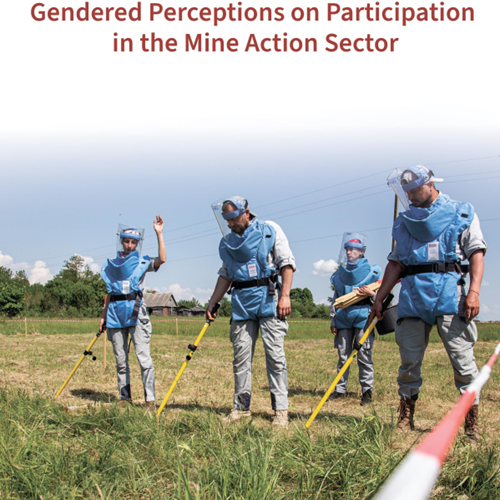Ukraine: Gendered Perceptions and Participation in the Mine Action Sector
Gendered norms in Ukraine, as in other contexts, influence men and women's access to resources and capacities, with patriarchal norms promoting discrimination and systematic bias against women at institutional-, structural-, community-, and household-levels. This is evident in the participation of women in the mine action sector, which is traditionally male-dominated.

Introduction
The importance of increasing the participation of women in the mine action sector has been recognised by the Oslo Action Plan to the Antipersonnel Mine Ban Convention (APMBC) in 2019 through a dedicated action point on gender equality and women’s participation (Action #3). 1 The increased participation of women in a traditionally male-dominated sector not only empowers women and challenges traditional gender roles, but also contributes to the United Nations Security Council Resolution 1325, stressing the importance of women’s equal and full participation as active agents in peace and security-relevant processes as well as to the wider Women, Peace and Security (WPS) agenda. Women have played crucial roles in reclaiming land for their communities by actively participating in demining, as seen in Yezidi communities in Northern Iraq or in the north of Sri Lanka.2 Additionally, employing women in community-facing roles, such as non-technical survey (NTS) and explosive ordnance risk education activities (EORE), is essential for effective mine action interventions, as these activities need to be designed and implemented through a gender and age lens.
In Ukraine, like in many other contexts, humanitarian mine action (HMA) is male-dominated due to gendered norms, including perceptions about safety risks and physical demands. This has resulted in limited female employment. According to a 2021 study, women constituted between 4% and 10% of the workforce in government demining agencies (State Special Transportation Service, State Emergency Service of Ukraine) and between 23% and 29% in international non-governmental organisations (NGO) conducting demining. Structural barriers have further constrained women's participation in Ukraine. Legislation prohibited the employment of women in the mine action sector until 2017. While national legislation supports equality of labour rights and prohibits discrimination based on gender, some legislation designed to protect women reinforces traditional gender stereotypes. For example, the Ukrainian Labor Code restricts women with young children from business trips, night work, and overtime, without similar protections for men. This legislation reinforces the stereotype that childcare is solely a women's duty and does not recognise women's agency and decision-making capacities.
Ukraine currently faces the significant challenge of being the world's most heavily mined country, posing threats to civilians and hindering reconstruction efforts, which in turn jeopardizes rural communities and global food security. Reclaiming safe land through survey and clearance, as a This is particularly crucial considering that the humanitarian mine action (HMA) sector is among the major priorities of the Ukrainian government and has been experiencing steady growth.
Recognising the importance of women's participation in the HMA sector, with women accounting for approximately 30% of the sector, DRC Ukraine aimed to gather representative data on the challenges of engaging women in the sector sustainably. To achieve this, DRC invited other HMA NGOs, through the Mine Action Area of Responsibility, to participate in a survey aimed to identify information gaps and understand the barriers women face in accessing and retaining employment in the mine action sector. This invitation was extended to NGOs, excluding governmental bodies or commercial companies, as they have more similar approaches and working conditions in the sector.
It is important to note that while this survey focuses on gendered barriers in the mine action sector, gender is not the only obstacle to working in this field. DRC is currently committed to conducting further assessments to better understand and address barriers to inclusion, making workspaces and job adverts accessible to people with various impairments. Additionally, DRC is working to ensure that awareness-raising efforts promote the employment of people with disabilities, including survivors of explosive weapons and veterans.